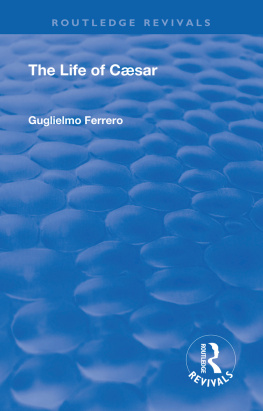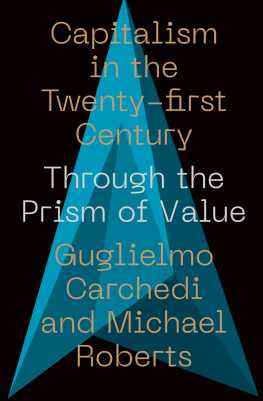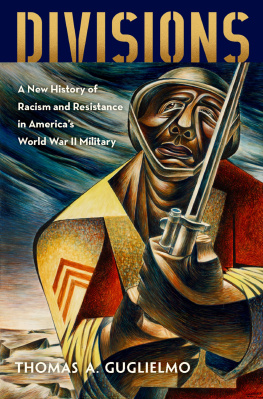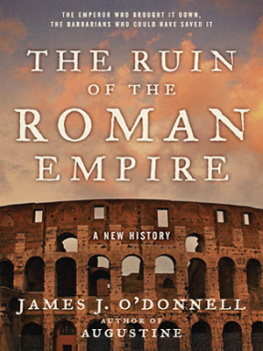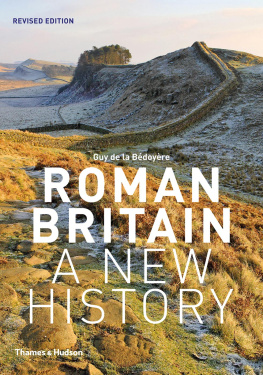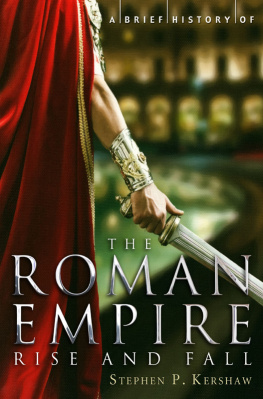CORRUPTION IN ANCIENT ROME AND ITS COUNTERPART IN MODERN HISTORY
..................
TWO YEARS AGO IN PARIS, while giving a course of lectures on Augustus at the Collge de France, I happened to say to an illustrious historian, a member of the French Academy, who was complimenting me: But I have not remade Roman history, as many admirers think. On the contrary, it might be said, in a certain sense, that I have only returned to the old way. I have retaken the point of view of Livy; like Livy, gathering the events of the story of Rome around that phenomenon which the ancients called the corruption of customsa novelty twenty centuries old!
Spoken with a smile and in jest, these words nevertheless were more serious than the tone in which they were uttered. All those who know Latin history and literature, even superficially, remember with what insistence and with how many diverse modulations of tone are reiterated the laments on the corruption of customs, on the luxury, the ambition, the avarice, that invaded Rome after the Second Punic War. Sallust, Cicero, Livy, Horace, Virgil, are full of affliction because Rome is destined to dissipate itself in an incurable corruption; whence we see, then in Rome, as to-day in France, wealth, power, culture, glory, draw in their traingrim but inseparable comrade!a pessimism that times poorer, cruder, more troubled, had not known. In the very moment in which the empire was ordering itself, civil wars ended; in that solemn Pax Romana which was to have endured so many ages, in the very moment in which the heart should have opened itself to hope and to joy, Horace describes, in three fine, terrible verses, four successive generations, each corrupting Rome, which grew ever the worse, ever the more perverse and evil-disposed:
Aetas parentum, peior avis, tulit
Nos nequiores, mox daturos
Progeniem vitiosiorem.
Our fathers were worse than our grandsires; we have deteriorated from our fathers; our sons will cause us to be lamented. This is the dark philosophy that a sovereign spirit like Horace derived from the incredible triumph of Rome in the world. At his side, Livy, the great writer who was to teach all future generations the story of the city, puts the same hopeless philosophy at the base of his wonderful work:
Rome was originally, when it was poor and small, a unique example of austere virtue; then it corrupted, it spoiled, it rotted itself by all the vices; so, little by little, we have been brought into the present condition in which we are able neither to tolerate the evils from which we suffer, nor the remedies we need to cure them.
The same dark thought, expressed in a thousand forms, is found in almost every one of the Latin writers.
This theory has misled and impeded my predecessors in different ways: some, considering that the writers bewail the unavoidable dissolution of Roman society at the very time when Rome was most powerful, most cultured, richest, have judged conventional, rhetorical, literary, these invectives against corruption, these praises of ancient simplicity, and therefore have held them of no value in the history of Rome. Such critics have not reflected that this conception is found, not only in the literature, but also in the politics and the legislation; that Roman history is full, not only of invectives in prose and verse, but of laws and administrative provisions against luxuria, ambitio, avaritiaa sign that these laments were not merely a foolishness of writers, or, as we say to-day, stuff for newspaper articles. Other critics, instead, taking account of these laws and administrative provisions, have accepted the ancient theory of Roman corruption without reckoning that they were describing as undone by an irreparable dissolution, a nation that not only had conquered, but was to govern for ages, an immense empire. In this conception of corruption there is a contradiction that conceals a great universal problem.
Stimulated by this contradiction, and by the desire of solving it, to study more attentively the facts cited by the ancients as examples of corruption, I have looked about to see if in the contemporary world I could not find some things that resembled it, and so make myself understand it. The prospect seemed difficult, because modern men are persuaded that they are models of all the virtues. Who could think to find in them even traces of the famous Roman corruption? In the modern world to-day are the abominable orgies carried on for which the Rome of the Csars was notorious? Are there to-day Neros and Elagabaluses? He who studies the ancient sources, however, with but a little of the critical spirit, is easily convinced that we have made for ourselves out of the much-famed corruption and Roman luxury a notion highly romantic and exaggerated. We need not delude ourselves: Rome, even in the times of its greatest splendour, was poor in comparison with the modern world; even in the second century after Christ, when it stood as metropolis at the head of an immense empire, Rome was smaller, less wealthy, less imposing, than a great metropolis of Europe or of America. Some sumptuous public edifices, beautiful private housesthat is all the splendour of the metropolis of the empire. He who goes to the Palatine may to-day refigure for himself, from the so-called House of Livia, the house of a rich Roman family of the time of Augustus, and convince himself that a well-to-do middle-class family would hardly occupy such a house to-day.
Moreover, the palaces of the Csars on the Palatine are a grandiose ruin that stirs the artist and makes the philosopher think; but if one sets himself to measure them, to conjecture from the remains the proportions of the entire edifices, he does not conjure up buildings that rival large modern constructions. The palace of Tiberius, for example, rose above a street only two metres wideless than seven feet,an alley like those where to-day in Italian cities live only the most miserable inhabitants. We have pictured to ourselves the imperial banquets of ancient Rome as functions of unheard of splendour; if Nero or Elagabalus could come to life and see the dining-room of a great hotel in Paris or New Yorkresplendent with light, with crystal, with silver,he would admire it as far more beautiful than the halls in which he gave his imperial feasts. Think how poor were the ancients in artificial light! They had few wines; they knew neither tea nor coffee nor cocoa; neither tobacco, nor the innumerable liqueurs of which we make use; in face of our habits, they were always Spartan, even when they wasted, because they lacked the means to squander.
The ancient writers often lament the universal tendency to physical self-indulgence, but among the facts they cite to prove this dismal vice, many would seem to us innocent enough. It was judged by them a scandalous proof of gluttony and as insensate luxury, that at a certain period there should be fetched from as far as the Pontus, certain sausages and certain salted fish that were, it appears, very good; and that there should be introduced into Italy from Greece the delicate art of fattening fowls. Even to drink Greek wines seemed for a long time at Rome the caprice of an almost crazy luxury. As late as 18 B.C., Augustus made a sumptuary law that forbade spending for banquets on work-days more than two hundred sesterces (ten dollars); allowed three hundred sesterces (fifteen dollars) for the days of the Kalends, the Ides, and the Nones; and one thousand sesterces (fifty dollars) for nuptial banquets. It is clear, then, that the lords of the world banqueted in state at an expense that to us would seem modest indeed. And the women of ancient times, accused so sharply by the men of ruining them by their foolish extravagances, would cut a poor figure for elegant ostentation in comparison with modern dames of fashion. For example, silk, even in the most prosperous times, was considered a stuff, as we should say, for millionaires; only a few very rich women wore it; and, moreover, moralists detested it, because it revealed too clearly the form of the body. Lollia Paulina passed into history because she possessed jewels worth several million francs: there are to-day too many Lollia Paulinas for any one of them to hope to buy immortality at so cheap a rate.



